科学研究
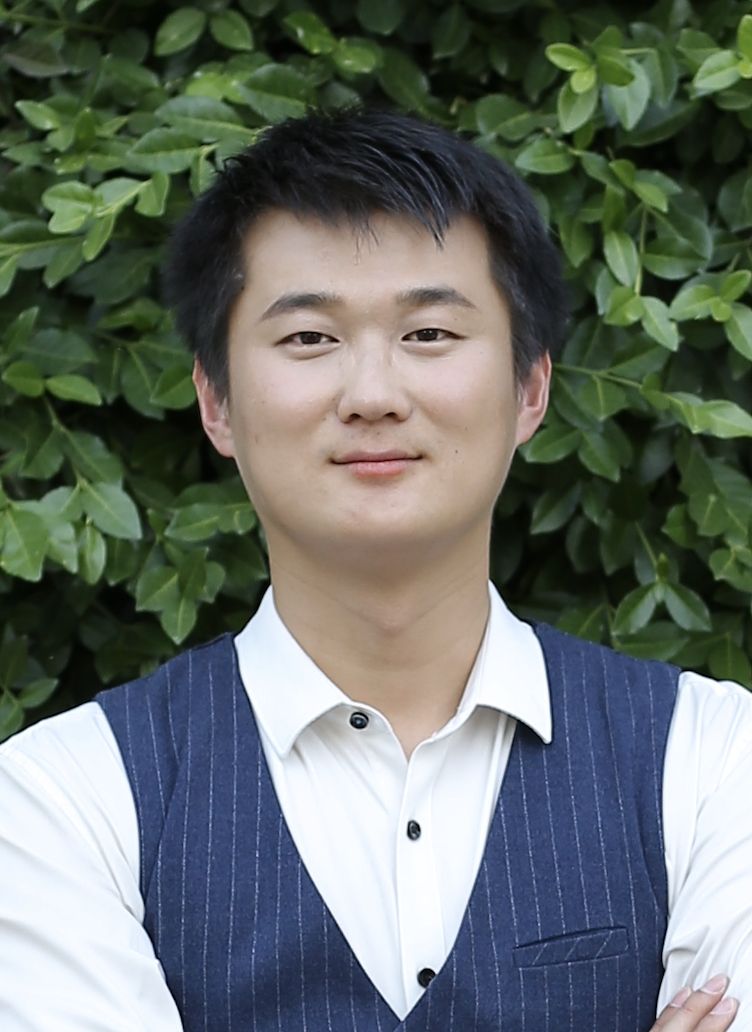
马恺声课题组
PI:Kaisheng Ma
研究方向:神经植入性系统、新型智能算法(计算机视觉CV)、计算机体系结构、人工智能芯片
 Preface - ARChip Name and Vision
Preface - ARChip Name and Vision
ARChip the name is short for A: Alogirthm, R: aRchitecture, C: Chip. And the characters ARC are merged in the logo: A is the nose, which is very sensitive, and easy to adapt to the environment; a left-right reversed R is the head, which is very important as a framework; C is the chip in the brain part, which is the core in the group. Within the chipset part, some symbols of biology can be shown, indicating that we are a interdisciplinary group among algorithm, architecture, chipset and biology.
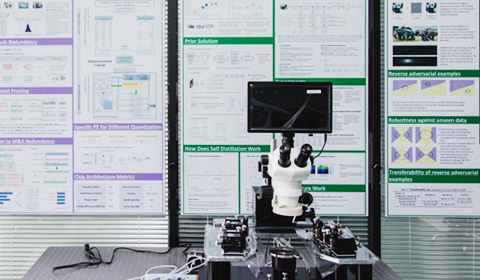
Human beings, for thousands of years, have been consistently pursuing two things: to have longer life; to be smarter. Here we focus on potential technology breakthroughs within decades. In our group, we focus on implanted devices to better monitor and even cure some diseases. We focus on using implanted devices to build brain-machine-interface to read the memories out and write back. We focus on all technologies that can enable true self-driving. We believe again odds and limits in the current technologies that tomorrow will be better than today.

Certain shifts in the technology bring with them a potential for revolution in human’s lifestyle or even the whole society. Just as the transition from wired to wireless telephones led to unprecedented changes in our communications and the shift from wall-power to battery-power transformed our expectations for computational systems, the shift from traditional logical systems to brain-inspired intelligent systems promises to fuel the next revolution in the artificial intelligence and Internet of Things.
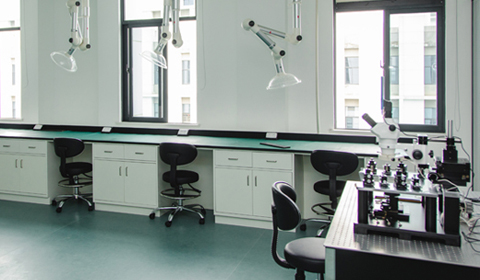
The importance lays in seeking the technological shifts in a vast of potential technologies before they are revealed by the broad masses of other researchers. To excavate them, I prefer the way of retrodicting the enabler technology through the future we envision and believe:
We envision that the self-driving technology can come true, which then can change the way we travel, the lifestyle we live, and even the housing prices of the city.
We envision that the robots with deep learning algorithms can learn things like human.
We envision that we can use 20W power to achieve human-like brain capabilities.
We envision that we can back up and restore memories.
We envision that we can control the things with thoughts, rather than languages.
We envision that we can communicate our emotions with other people through brain interface.
We envision that the implanted devices can fundamentally change the way of measuring medical parameters, and elongate the human life.
With these visions in mind, I come back from US. to China Tsinghua Univeristy in 2018 to found the ARChip Lab, where I believe in vertical research methodologies from algorithms, architecture down to chips.
I also believe that to realize these visions, we needs both efforts from industry and academia. And those explorations with long efforts are better to be done in universities.
If you believe in similar visions, you are welcome to join us !
Let's work together to build a better world !
AI ALGORITHMS TEAM

Zhongfan Jia | Ph.D Candidate
Zhongfan Jia is now pursuing his Ph.D. degree in ARChip Lab brain-inspired algorithms team, IIIS, Tsinghua University, from 2020. He obtained his bachelor’s degree from Computer Science and Technology at school of Electronics Engineering and Computer Science, Peking University. He has a mixed background in both algorithm and computer architecture. His research direction is to explore bio-inspired subhuman AI algorithms and design brand-new suitable architectures. Now he is working on bio-inspired and brain-mimic algorithms about robust recognition, fast learning, and controllable forgetting.

Junbo Zhang | Ph.D Candidate
Junbo Zhang graduated from Peking University with the major in Psychology and Computer Science and now is pursuing Ph.D at Tsinghua university. He is a team member in ARChip Lab working on brain-inspired algorithms. He has an interdisciplinary background in cognitive neuroscience and AI algorithm. His research interests lie in exploring brain-inspired AI algorithms which can be more general, flexible, compact and low energy consumption.

Zhihan Cai | Master Degree Candidate
Zhihan Cai received her B.S. degree in Mathematics and Computer Science from Hong Kong University of Science and Technology. She is currently pursuing her master degree in ARChip Lab, IIIS, Tsinghua University, supervised by Prof. Kaisheng Ma. Her research interests include autonomous driving, robotics, and bio-inspired AI algorithms, which can be applied in biomedicine.

Zekun Qi | Master Degree Candidate
Zekun Qi is currently pursuing his Master degree in ARChip Lab under the supervision of Prof. Kaisheng Ma. He obtained his B.S. degree in Xi'an Jiaotong University, majoring in automation. During his bachelor period, he won the runner-up of CUPT2020 as the leader. His current research direction includes 3D computer vision, self-supervised learning and multi-modal learning. Some of his paper were published at the top AI conference.

Guofan Fan | Master Degree Candidate
Guofan Fan is currently pursuing his Master’s degree in ARChip Lab. He has various interests in many fields. During his bachelor period, he won the Finalist award in the 2021 Interdisciplinary Contest in Modeling (ICM), worked as a Front-End intern in ByteDance, and finally obtained his B.S degree in Biotechnology from Xi’an Jiaotong University. His current research focuses on 3D computer vision and unsupervised learning. He also has interests in Al-biology research, such as AI for drug discovery.

Hongyang Chen | Ph.D Candidate
Hongyang Chen is currently pursuing Ph.D. degree in ARChip Lab. He received his B.S. degree from Chang'an University, where he ranked first at the Department of Computer Science and was awarded a number of prizes, including the National Scholarship. His research interests include precision, speed, and robust trade-off for general object detection, the robustness and interpretability of the model, especially the detection of frame drops caused by natural factors in reality and the adversarial attacks.

Muzhou Yu | Ph.D Degree Candidate
Muzhou Yu is currently pursuing the Master Degree in ARChip Lab. He studied automation during his bachelor’s degree in Northeastern University, China from 2016 to 2020. During his stay in Northeastern University, he was awarded the ‘National scholarship’ for three times and has published papers on the CCC etc. in 2019 and won the first prize in International University Mathematical Modeling Competition. Since 2019, he has joined ARChip Lab as an AI Algorithms team member under the supervision of Prof. Kaisheng Ma. He has a broad interest in AI.
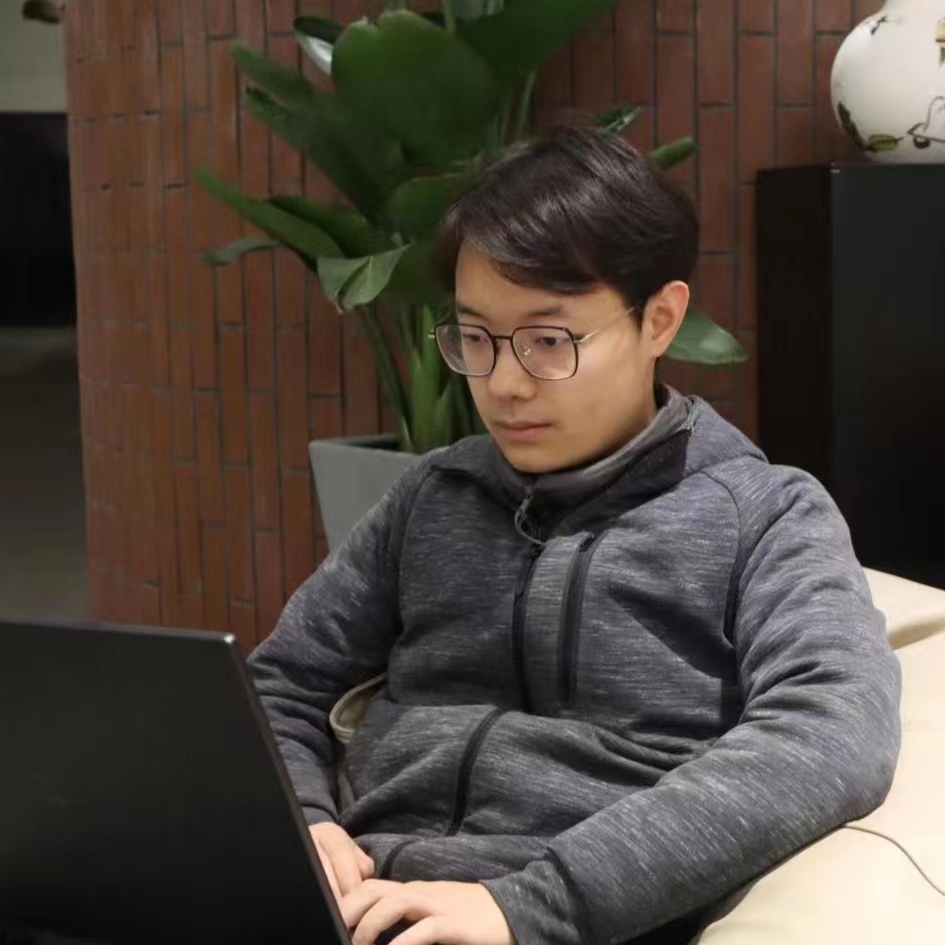
Kailu Wu | Master Degree Candidate
Kailu Wu achieved his B.S. degree at IIIS, Tsinghua University. He was born in Chengdu, Sichuan Province, China. He had some experience in algorithm design and won the gold medal of NOI2017. His current research focuses on neural networks robustness, interpretability, domain adaptation, and he has a wide range of interests about AI.
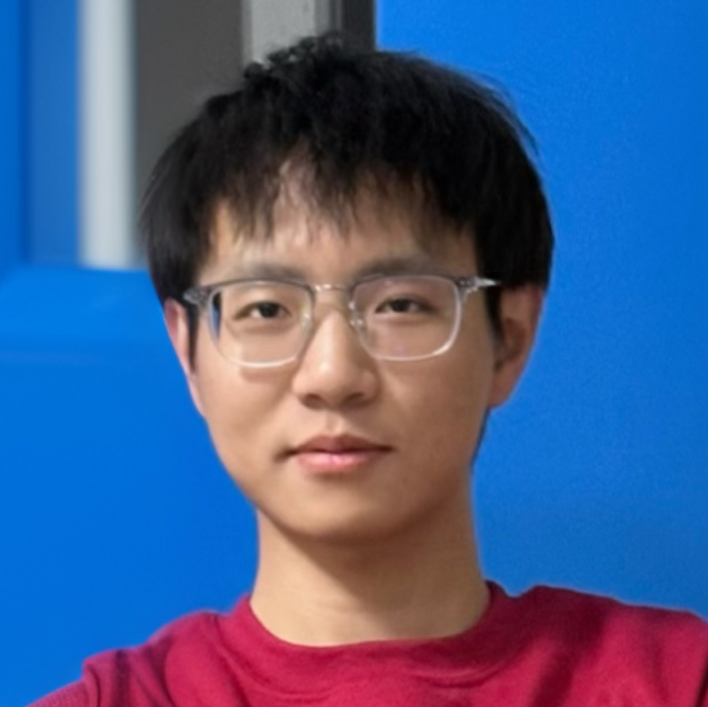
Hongwei Yan | Ph.D Candidate
Hongwei Yan graduated from IIIS, Tsinghua University with a B.S. degree in Computer Science, and now he proceeds to study as a Ph.D. student at McGovern Institute for Brain Research. Under the joint training of Prof. Kaisheng Ma and Prof. Yi Zhong, the journey of his exploration starts from the intersection of computation and biology. His research interests include brain-inspired AI algorithms, multimodal and continual learning, intelligent system with bio-like memory capability.

Shuyun Lin | Ph.D Candidate
Shuyun Lin joined ARChip in the spring semester of 2022 and is currently persuing her Ph. D degree in IIIS, Tsinghua University. She graduated from Shanghai Jiao Tong University, majoring in Computer Science. Her research experience has mainly covered explanable AI, deep reinforcement learning and AI for science. She is now focusing on AI ISP tuning, also maintaining strong interest in the emerging capability of AI.
AI CHIP ARCHITECURE, DESIGN and TAPOUT TEAM

Guiming Shi | Ph.D Candidate
Guiming Shi obtained his bachelor’s degree from Electrical Engineering and Automation in the department of electrical engineering, Tsinghua University and is pursuing his M.S. degree in IIIS, Tsinghua University. His research interests are computer architecture and FPGA design for financial application. He is a veteran college student who served in the Navy, during which he won the excellent soldier twice. Since 2020, he has joined ARChip Lab as an AI Chip team member under the supervision of Prof. Kaisheng Ma.

Yuchen Wei | Ph.D Candidate
Yuchen Wei achieved his B.S. degree at IIIS, Tsinghua University. Now he is pursuing his Ph.D. degree in ARChip Lab.He has a broad interest in computer architecture and hardware design, which leads to his current research direction on computer architecture, hardware-software co-design for neural networks computation and chip architecture design for edge AI applications. He is now focusing on algorithms on energy-efficient software mapping for executing neural networks on chiplets.

Xuan Wang | Ph.D Candidate
Xuan Wang graduated from Xi'an Jiaotong University with a bachelor's degree in Computer Science from the School of Electronic and Information Engineering. During his undergraduate years, he studied in Qian Xuesen Class and was ranked in the top three in his major. He also received several National Scholarships from the Ministry of Education. He has a mixed background and experience in various fields, such as Artificial Intelligence, Architecture, SLAM, and Software Defined Networks. In 2022, He joined ARChip Lab as a member of the AI chip team under the guidance of Prof. Kai-Sheng Ma. He has a wide range of interests in Computer Architecture, including 3D ICs, Software and Hardware Co-design for Heterogeneous Computing, Advanced Packaging, etc.

Zijian Zhu | Ph.D Candidate
Zijian Zhu achieved his bachelor's degree at IIIS, Tsinghua University. Now, he is pursuing his Ph.D. degree in ARChip Lab. He was born in Beijing, China. During his high school study, he participated in Olympiad in Informatics and won the gold medal of NOI2018. He has a mixed background in algorithm design and computer architecture. And he had some projects of scheduling on the DNN accelerator. His research interests are computer architecture, hardware-software co-design for neural network computation, and algorithm design for hardware.

Yinxiao Feng | Ph.D Candidate
Yinxiao Feng is now pursing his Ph.D. degree in IIIS, Tsinghua University. During his Bachelor’s degree in Shanghai JiaoTong University, he majored in Information Engineering (AI direction) and a double degree in Mathematics and Applied Mathematics. He was also a member of Zhiyuan Honors Program of Engineering, which consists of the top 5% students of all engineering students at SJTU. During his undergraduate years, he won many distinctive awards and honors, including national scholarship. He has a mixed background and experiences in materials, devices, circuits, algorithms, and hardware. He even has experience of clean room fabrication. He is now participating a team in ARChip Lab, inventing a next-generation single cell level human machine interface.
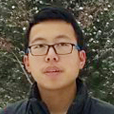
Zehua Li | Ph.D Degree Candidate
Zehua Li received his B.S degree at Department of Microelectronics from Xi’an Jiaotong University. During his bachelor period, he studied in Qian Xuesen Class and ranked the first among students majoring in microelectronics. He also won awards in different contests, including Mathematical Modeling and Mechanics Competition, and got a patent about computer architecture. He used to study as a visiting student of University of California, Berkeley, during which period he participated in the project of RISC-V CPU-design and Discriminator design. His is interested in computer architecture and digital circuit design, especially edge AI chips related to loT.
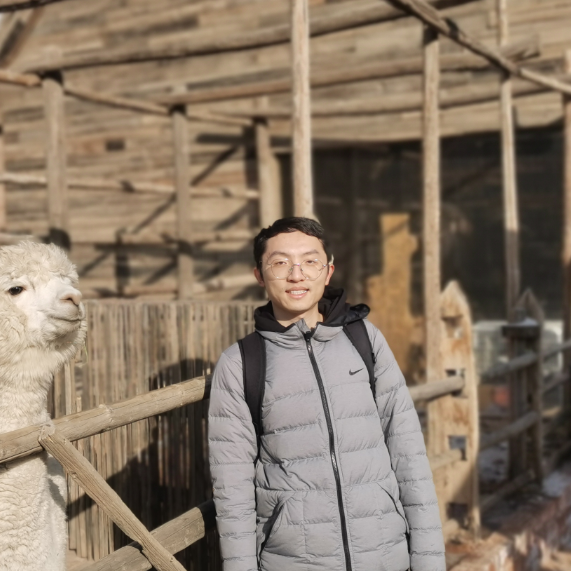
Jingwei Cai | Ph.D Candidate
Jingwei Cai earned his B.S. degree in Integrated Circuit and System Design from the University of Electronic Science and Technology of China. During his undergraduate studies, he achieved a weighted average score of 95.3, ranking first in his department and breaking the record in the university. He was also awarded the title of Outstanding Student of UESTC (a distinction granted to only ten graduates each year, similar to the Tsinghua Special Award), and received more than ten scholarships including three National Scholarships. Since 2021, he has been pursuing his Ph.D. at Tsinghua University's IIIS ARCHIPLAB, with research interests primarily focused on chiplet architecture, multicore DNN accelerator architecture and compilation, silicon photonics wafer-scale computing architecture, and recommendation system acceleration. His publications are available on his Google Scholar site: //scholar.google.com/citations?hl=en&user=OSxlefIAAAAJ. Looking towards a future in the industry, he is currently seeking internship and job opportunities. Interested parties can contact him at: [email protected].
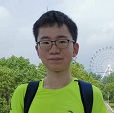
Zuotong Wu | Undergraduate
Zuotong Wu is an undergraduate student at IIIS, Tsinghua University. He was born in Fuzhou, Fujian, China. In his high school years, he put his efforts on Olymiad in Informatics and got a gold medal on NOI2018. In his junior year in Tsinghua, he became interested in computer architecture and joined the team. He is now working on efficient alorighms to find energy-saving mapping schemes on chiplets.

Sen Peng | Master Degree Candidate
Sen Peng achieved his B.S. degree at the University of Electronic Science and Technology of China. In ARChip Lab, he is pursuing Master Degree in chip team. With a bachelor background of software engineering, he has a broad interest in system software and hardware-software co-design. Currently, he is focusing on software mapping for NPU. In daily life, he has a great passion for fitness which he believes can contribute to his research.
IMPLANTABLE CHIPS TEAM

Qichao Ma | Engineer
Qichao Ma received his B.S. degree in Telecommunications form XiDian University in 2015 and M.S. degree in Electronics from Polytech Nice Sophia, France in 2018. In 2018, he has worked on IC design as an intern in Ethertronics SAS France for six months. Since 2019, He has joined ARChip lab to conduct research on Silicon Neural Component Dust. His current research focuses on ultrasound imaging, backscattering communication, energy harvesting and radio frequency integrated circuit design for energy harvesting and backscattering communication.
SUPPORTING TEAM

Yijie Guan | Research Assistant
Yijie Guan got her bachelor's degree from Beijing Normal University with a major in English Language and Literature. She has got the certificate of TEM-8. Now she is a research assistant in ARchip lab. Within the lab, she is responsible for all work besides research, including translation, English writing verification, financial affairs, administration, and all details that keep the lab running.
ALUMNI
Name |
Title |
Contributions |
Now |
Linfeng Zhang |
Ph.D Alumni |
AI |
Assistant Professor at Shanghai Jiao Tong University |
Zhanhong Tan |
Ph.D Alumni |
Architecture |
CTO at Polar Bear Tech |
Dapeng Cao |
Master Alumni |
AI |
Engineer at GuoDianNanRui |
Yukang Shi |
Master Alumni |
AI |
Engineer at DiDi |
Sia Huat Tan |
Master Alumni |
4 AI papers |
Engineer at Hulu |
Jan-Henrik Lambrechts |
Master Alumni |
2 AI papers |
Startup |
Shaokai Ye |
Engineer |
Pruning & 2 AI papers |
Ph.D at Brown Univ. |
Dehui Li |
Engineer |
MUSE V1 Chip |
Chengdu |
Yuanqing Miu |
Intern |
Simulator for AI Chip |
Ph.D at PennState |
 Research Directions
Research Directions
1. Implanted Devices for Human Machine Interface
- Minimum Invasive Implanted Chips
- Power Delivery and Communication based on
Ultrasound
- Multiple Channel Brain Dusts for Human Machine
Interface
2. Bio-plausible Novel AI Algorithms
- Bio-plausible Algorithms: Explainable and Robust AI
- Computer Vision for Self-driving: Classification,
Detection, Segmentation, PointCloud etc.
- Novel Sensor Fusion Models
- Compact Model Design: Pruning, Quantization,
Distillation etc.
3. Computer Architecture
- Any Novel Computing Mechanism that can Accelerate
>10 times
- High Performance AI Architecture for Self-driving
- Energy Efficient AI Architecture
- Sparse-aware AI Architecture
- Chiplet Solutions
4. AI Chips for Self-driving
- Video Processing Accelerator AI Chips for Real-time
Processing
- PointCloud AI Chips
- Secure Anti-adversarial AI Chip
- Online Learning AI Chip



